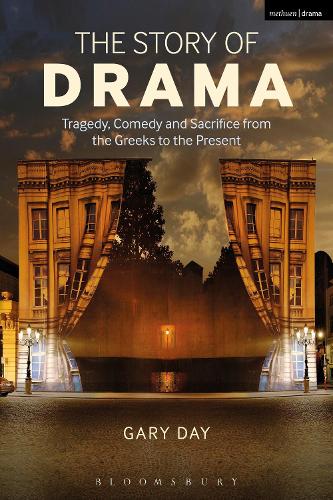
The Story of Drama: Tragedy, Comedy and Sacrifice from the Greeks to the Present
(Paperback)
Available Formats
Publishing Details
The Story of Drama: Tragedy, Comedy and Sacrifice from the Greeks to the Present
By (Author) Dr Gary Day
Bloomsbury Publishing PLC
Methuen Drama
25th August 2016
United Kingdom
Classifications
General
Non Fiction
Literary studies: general
809.2
Physical Properties
Paperback
248
Width 156mm, Height 234mm
432g
Description
Tracing the history of tragedy and comedy from their earliest beginnings to the present, this book offers readers an exceptional study of the development of both genres, grounded in analysis of landmark plays and their context. It argues that sacrifice is central to both genres, and demonstrates how it provides a key to understanding the grand sweep of Western drama. For students of literature and drama the volume serves as an accessible companion to over two millennia of drama organised by period, and reveals how sacrifice represents a through-line running from classical drama to today's reality TV and blockbuster movies. Across the chapters devoted to each period, Day explores how the meanings of sacrifice change over time, but never quite disappear. He charts the influences of religion, social change and politics on the status and purposes of theatre in each period, and on the drama itself. But it is through a close study of key plays that he reveals the continuities centred around sacrifice that persist and which illuminate aspects of human psychology and social organisation. Among the many plays and events considered are Aeschylus trilogy The Oresteia, Aristophanes Women at the Thesmorphia, Menanders The Bad-Tempered Man, the spectacles of the Roman Games, Seneca's The Trojan Women, Plautus's The Rope, the Cycle plays and Everyman from the Middle Ages, Shakespeare's King Lear and A Midsummer Nights Dream, Middleton's The Revengers Tragedy, Jonson's Every Man in His Humour, Thomas Otway's The Orphan, William Wycherley's The Country Wife, Wilde's A Woman of No Importance, Beckett' Waiting for Godot, Tennessee Williams's A Streetcar Named Desire, Suzan-Lori Parks's Topdog/Underdog, Sarah Kane's Blasted and Charlotte Jones Humble Boy. A conclusion examines the persistence of ideas of sacrifice in today's reality TV and blockbuster movies.
Reviews
The Story of Drama is an ambitious book, richly informative, consistently readable and conscientiously argued. * Times Literary Supplement *
[A] concise, valuable survey ... Its warm, conversational tone suggests that students on the De Montfort University course whose lectures informed this volume had a fine teacher indeed. * Times Higher Education *
Definitely one for any sixth former doing Drama or Theatre Studies and for anyone teaching drama to any age group. * InkPellet *
If you want to bone up on the history of drama ... then try Gary Days very readable The Story of Drama which examines drama and how it has developed from the Greeks to the 21st century mostly through the themes of tragedy, comedy and sacrifice. * SusanElkin.co.uk *
In helping us to rethink how we discuss theatre, Day is providing critics and educators a new set of tools with which to work This book would be most useful in a script-analysis classroom as a way to begin interesting discussions about playsor rather to rethink how we approach those discussions. Rather than asking 'What does this play mean,' Day wants us to ask 'How does this play maintain social cohesion through sacrifice' * Theatre Topics *
Offers powerful insights into the workings of sacrifice in both tragic and comic modes of drama, and offers a wide set of historical examples of how sacrifice is embedded in both modes The books final chapters bring its insights together, offering the kind of critical depth and potential richness that reward close reading Days last chapter builds a compelling case for how complexly the power of these deep-seated, ancient structuresways of shaping the world and how we feel about itare embedded in contemporary, popular sensibilities and entertainments I am grateful to Gary Day for his labors in bringing these volcanic forces to light, showing how we might unbury them, and revealing how they persist in contemporary dramatic forms far from the ancient circumstances of their birth. * Journal of Dramatic Theory and Criticism *
What is fascinating about this study is the way in which Day repositions familiar plays, using them as evidence of radical changes in our concepts of sacrifice and in the process casting new light on their well-worn pages [A] solid work that should be especially useful in courses on script analysis, as well as in those that attempt to link the history of great dramas to the cultural contexts from which they emerge. * Theatre Survey *
Author Bio
Gary Day recently retired as principal lecturer at De Montfort University, UK, where he taught courses on the history of drama, the eighteenth century, modernism, contemporary drama and contemporary fiction. He is the author of Literary Criticism: A New History (2008) and Modernist Literature: 1890-1950 (2010). He has edited a dozen books, the latest being The Wiley Encyclopaedia of British Eighteenth Century Literature (2015) with Jack Lynch. He has contributed to the Cambridge History of Literary Criticism and to the Oxford Guide to Literary Theory and Criticism. He has also been a regular columnist and reviewer for the Times Higher.
